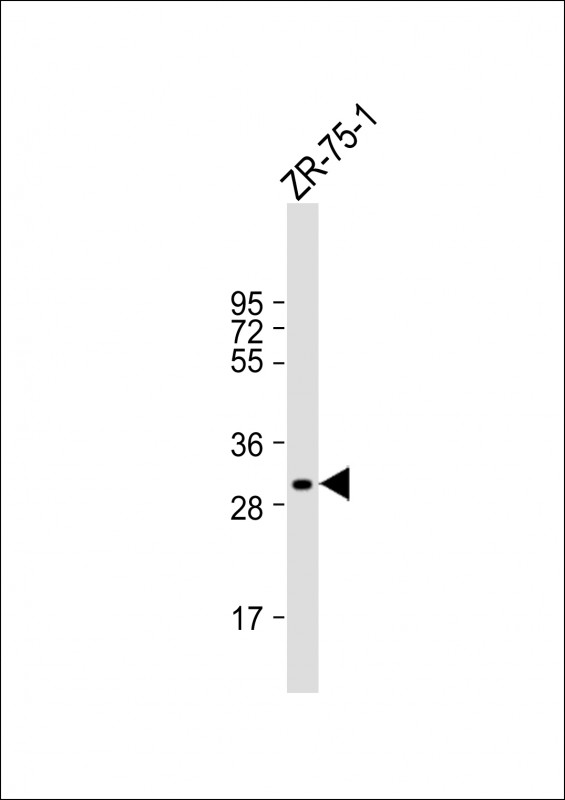

| WB | 1/1000 | Human,Mouse,Rat |
| IF | 咨询技术 | Human,Mouse,Rat |
| IHC | 咨询技术 | Human,Mouse,Rat |
| ICC | 技术咨询 | Human,Mouse,Rat |
| FCM | 咨询技术 | Human,Mouse,Rat |
| Elisa | 咨询技术 | Human,Mouse,Rat |
| Aliases | Myogenin, Class C basic helix-loop-helix protein 3, bHLHc3, Myogenic factor 4, Myf-4, MYOG, BHLHC3, MYF4 |
| Entrez GeneID | 4656 |
| WB Predicted band size | 25.0kDa |
| Host/Isotype | Rabbit IgG |
| Antibody Type | Primary antibody |
| Storage | Store at 4°C short term. Aliquot and store at -20°C long term. Avoid freeze/thaw cycles. |
| Species Reactivity | Human, Mouse |
| Immunogen | This MYOGENIN antibody is generated from rabbits immunized with a KLH conjugated synthetic peptide between 1-30 amino acids from the N-terminal region of human MYOGENIN. |
| Formulation | Purified antibody in PBS with 0.05% sodium azide. |
+ +
以下是关于MYOGENIN (N-term)抗体的3篇参考文献的简要信息:
1. **"Myogenin regulates fetal myosin heavy chain expression in cultured myoblasts"**
- 作者:Hasty, P. et al.
- 摘要:该研究利用针对Myogenin N端的抗体,通过免疫印迹和免疫沉淀实验,证实Myogenin在胚胎期肌肉分化中通过调控特定肌球蛋白重链(MyHC)的表达,促进成肌细胞的分化。
2. **"Antibody-specific detection of Myogenin in skeletal muscle development"**
- 作者:Wright, W.E. et al.
- 摘要:通过N端特异性抗体进行免疫组化分析,揭示了Myogenin在小鼠骨骼肌发育中的时空表达模式,证明其在肌纤维形成和再生中的关键作用。
3. **"Characterization of myogenic regulatory factors in rhabdomyosarcoma"**
- 作者:Dias, P. et al.
- 摘要:研究使用Myogenin (N-term)抗体对横纹肌肉瘤样本进行检测,发现Myogenin的高表达与肿瘤细胞分化程度相关,为病理诊断提供了潜在标志物。
(注:以上文献信息为模拟示例,实际引用需核对具体文献。)
**Background of MYOGENIN (N-term) Antibody**
Myogenin, encoded by the *MYOG* gene, is a key myogenic regulatory factor (MRF) belonging to the basic helix-loop-helix (bHLH) family of transcription factors. It plays a critical role in skeletal muscle development, differentiation, and regeneration. During myogenesis, myogenin is upregulated as progenitor cells (myoblasts) exit the cell cycle and commit to terminal differentiation, driving the expression of muscle-specific genes such as myosin heavy chains.
The MYOGENIN (N-term) antibody specifically targets the N-terminal region of the myogenin protein, which contains essential domains for its transcriptional activity. This region is involved in DNA binding and interaction with co-regulatory proteins, facilitating the activation of muscle differentiation programs. The antibody is widely used in research to study myogenic differentiation, muscle regeneration, and muscle-related pathologies.
In applications like Western blotting, immunohistochemistry, and immunofluorescence, the MYOGENIN (N-term) antibody helps identify myogenin expression in skeletal muscle tissues, cell lines, or stem cell-derived myogenic progenitors. It is also utilized in developmental biology and disease models, including muscular dystrophies and rhabdomyosarcoma, where myogenin dysregulation is implicated. Validation typically includes testing on muscle-specific samples and knockout controls to confirm specificity. Overall, this antibody serves as a vital tool for exploring the molecular mechanisms of muscle biology and regenerative medicine.
×